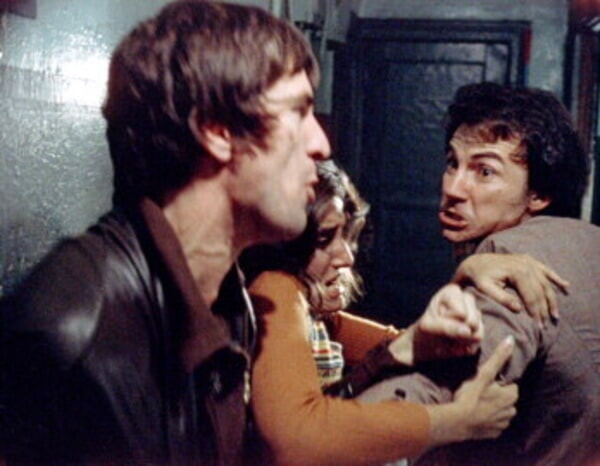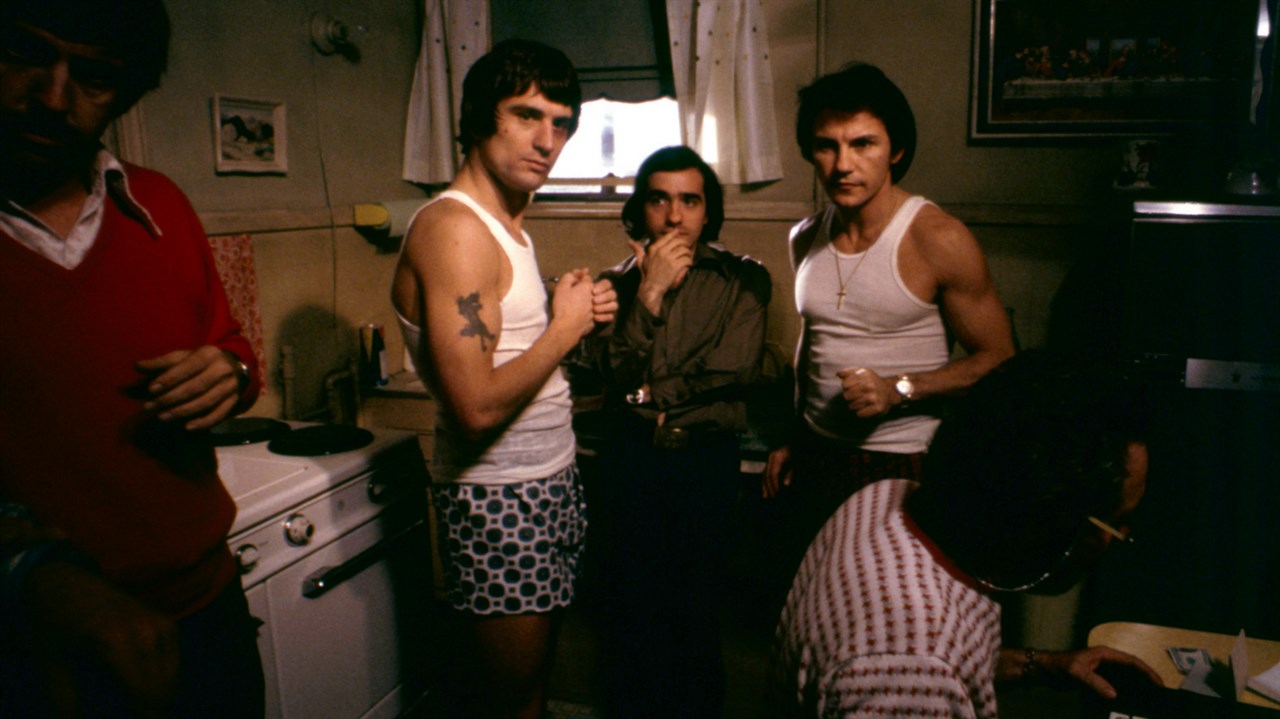Martin Scorsese's nearly four-hour long crime epic The Irishman dropped on Netflix a few weeks back. It's already garnering awards talk, and while I can see certain aspects of the film being worthy of that praise—in terms of performances, Al Pacino steals the show—for the most part it was an utter slog to get through for this avowed Scorsese acolyte.
Let me clarify. I haven't truly loved a Scorsese movie in a very long time. However, his earliest 1970s films, all the way up to his 1990s work, have always been absolutely crucial to my love of movies. These were some of the first films that helped teach me the language of auteur cinema, shaping forever after how I would see, feel, process, absorb, and analyze film. So, go ahead and watch The Irishman if you have half a work day to kill. But please, follow up with some of Scorsese's best films as either a reminder or, if you've never seen them before, a mind-blowing introduction to the man's cinematic genius. With that in mind, here are five Scorsese films I always recommend. Not only are these my five favorites, they're also wonderful examples of Scorsese at his best.
The Age of Innocence (1993)
Has there ever been a better movie made about desire and longing than this Edith Wharton adaptation? I suspect not. Scorsese and screenwriter pal Jay Cocks suffused the film with a passionate sexual intensity than Wharton's novel certainly didn't contain. Yet it's that passion that makes the film so very memorable. Two exquisite lead performances from Michelle Pfeiffer and Daniel Day-Lewis—both of whom should have won Academy Awards, yet neither were even nominated. Insanity. Legendary cinematographer Michael Ballhaus is positively on fire throughout, with one indelibly framed and shot sequence after another. Bathing Pfeiffer in oversaturated bursts of primary colors is one example why the film is a visual feast for the eyes, heart, and mind—all in service of an emotionally gut-wrenching meditation on unrequited love. No one thought of "Scorsese" and "unrequited love" in the same sentence back then, but he proved what many of us always knew: his cinematic talents translate across genres.
Taxi Driver (1976)
A Stygian descent into the crime-infested urban nightmare that was New York City in the 1970s, Taxi Driver has lost none of its raw power over the years. Vietnam vet taxi driver Travis Bickle (Robert De Niro, in one his best performances) is a man who would not take it anymore, and the entire film is like watching a train wreck occur in slow motion, as Bickle struggles mightily to control his urges to cleanse the streets of vermin and scum. Scorsese himself makes an unforgettable cameo as a sadistic cuckolded husband who repeatedly asks a silent Bickle, "Did you ever see what a .44 Magnum pistol can do to a woman’s face? I mean, it’ll fucking destroy it. Just blow her right apart.” The film's notoriously violent final act, followed by a shockingly serene finale, is legendary for a reason. Bickle's pent-up rage finally explodes in a whorehouse, where he "saves" the young prostitute Iris (Jodie Foster) and murders several pimps and johns, only to be hailed as a vigilante hero by the local papers afterward. The film sticks with you, as does Bernard Hermann's somber score.
Alice Doesn't Live Here Anymore (1974)
A stunning, shining example of how excellent Scorsese can be
when working outside the zones most audiences expect from him. The rare, female-lead driven Scorsese flick, Alice Doesn't Live Here Anymore is one of the very best of the 1970s genre
I like to longwindedly call “Mom embarks on a road trip/journey of
self-discovery with her young kid in tow.” Ellen Burstyn’s Oscar was richly deserved. It’s one of the best performances by any actor across all of
Scorsese’s films. Her relationship with her young son (Alfred Lutter gives a
terrific child actor performance) is so natural and lived in, it’s almost
impossible to imagine they’re actually just acting. Eleven year old Jodie
Foster is delightful (“Wanna get high on Ripple?”). There are also a few brief
moments of that trademark Scorsese male violence threatening to erupt (and in
one scene with Scorsese regular Harvey Keitel, it does, to frightening effect). The “Can I touch your beard?” scene
between Burstyn and Kris Kristofferson is still one of the most tenderly romantic moments this
old softy’s ever seen onscreen. A real gem of a film. Coincidentally, it turns forty-five this month.
Mean Streets (1973)
A story of youth and young (toxic) manhood on the same New York streets that Scorsese grew up on, Mean Streets announced the visionary director as one to watch. It's not hard now, all these years later, to grasp just how powerfully alive the film felt, because it still feels that way today. Alive and crackling with raw unbridled energy, much of it provided by frequent Scorsese collaborators Keitel and De Niro, the film is an intoxicating watch. Keitel and De Niro together were as electrifying as any two leads of the era. De Niro's Johnny Boy is a live wire, and one of the actor's most charismatic performances. The animosity and violence simmering underneath their characters' loving friendship is palpable throughout. Much of the film, though, is about young men hanging out in bars, goofing off late at night, trying to find a way up and out of their circumstances. Keitel and De Niro play characters on the periphery of organized crime, and while Scorsese went on to make far more explicitly mob-oriented films, for me none ever equaled the pure magic he created on those Mean Streets in 1973.
The King of Comedy (1982)
Few films in Scorsese's cannon are as difficult to sit through as The King of Comedy. Scorsese lingers over extremely uncomfortable moments in the life of aspiring (and delusional) comedian Rupert Pupkin (De Niro, in another performance for the ages), making us squirm in our seats, but also keeping us completely riveted. Like a few of the other films on this list, The King of Comedy was a failure at the box office but, if the internet is any indication, has only grown in esteem among critics and audiences alike in the years since.
*****
A few other Scorsese films I highly recommend you seek out as well: After Hours (1985), Bringing Out the Dead (1999), Raging Bull (1980), Goodfellas (1990), and The Departed (2006).







It's uncanny how once again we're on the same wavelength; I haven't watched a Scorsese film since Casino in the mid-90s. I dip into Mean Streets all the time, in fact I've probably watched it more than any other film, apart from Badlands. It’s a great late night film, wild, crazy, uncontrollable and fascinating. Much like De Niro’s Johnny Boy with Jumpin Jack Flash blaring over his entrance.
ReplyDeleteWhat made The King of Comedy truly great for me, was when Pupkin finally does his routine, I actually found him very funny. As always De Niro showed a deep respect for the character and the story. I must be more of a De Niro than Scorsese fan because I like Goodfellas and Raging Bull too. I once met Jake la Motta and got his autograph. Like the film of his life, he certainly didn't mellow with age.
Sorry for rambling, but I really enjoyed this piece. Your writing is always so interesting, I've shared some of it once again in a dual review over at my site. As always I'd love to hear your thoughts.